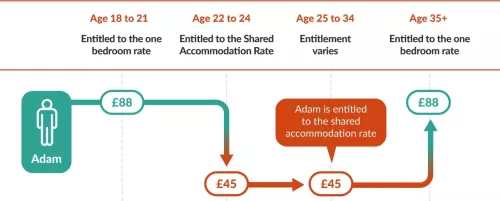Over 9,000 young people aged 18 or over left the care system last year. They officially became care leavers; leaving the care system behind them as they moved on into independence. Many care leavers' transition to adulthood and independence is successful, going to university or getting their first job. But we also know that many care leavers do not find the transition easy and are, in short, let down by the systems which should be providing a safety net and vital support for care leavers.
A third of the young people we accommodate at Centrepoint are care leavers. Their age and the things they have experienced means they need to live in accommodation which also offers support. It’s a safety net and a stepping stone.
In 2017, we published From Care to Where?, which examined why young people were leaving the care system and becoming homeless. Out of all the care leavers statistics we discovered, most worryingly was that 26% of those surveyed had sofa-surfed and 14% had slept rough.
The young people we spoke to described multiple complex reasons why they had failed to secure housing or supported accommodation for care leavers and had fallen into homelessness. What was very clear, though, was that it felt almost impossible to leave homelessness behind.
When we examined this further, it became clear that being able to afford to live independently was a critical barrier to care leavers moving into independent accommodation. Since then, we have been calling on the government to lengthen the amount of time they provide extra support for care leavers with their housing costs.
It was just a challenge paying the rent because at that time I was on benefits. I was 17. I didn’t even have any idea of what the rent was. It wasn’t until I was working, because I was on such a low wage – £3.30 an hour because I was on an apprenticeship – it didn’t work out. – Craig, care leaver
The benefit system provides vital financial support for care leavers
For anyone living in the private rented sector, the amount of financial support you can claim to cover your rent is set at the Local Housing Allowance (LHA). The LHA has a number of different levels, depending on the size of accommodation that you require – according to the government.
Most single adults under the age of 35 are entitled to the lowest level of LHA, the Shared Accommodation Rate. This is based on the average cost of renting a room in a shared house in your local area. It’s also set so that it only covers the cheapest 30% of shared room rents, limiting what you can afford. And, to make matters worse, all benefits have been frozen since 2016 so it doesn’t match up to current rent costs.
In recognition of their vulnerability and the unique problems facing care leavers, they are currently exempt from the Shared Accommodation Rate from age 18 to 21. During this time, they get the higher one-bed rate of LHA, based on the cost of renting a one bedroom flat. This additional financial support for care leavers is vital and enables them to access a wider pool of potential properties.
However, once they turn 22, their entitlement falls to the Shared Accommodation Rate (SAR). So overnight, their benefit entitlement decreases and they are put at risk of losing their tenancy.
An example, based on LHA rates in Sunderland:
Adam is a care leaver and lives in a one-bedroom flat. He is entitled to £88 per week to cover his rent. On his 22nd birthday, the total amount of LHA that Adam is entitled to drops to £45, in line with the Shared Accommodation Rate. If he’s going to stay in his flat, he needs to make up the £43 per week shortfall. However, he only gets around £63 per week through Universal Credit to cover all of his other living costs. In order to pay his rent and avoid homelessness, he’ll be left with just £20 per week to survive on.

Lower benefit entitlements, varied by age, can leave some care leavers in difficult situations
It’s time to change the story for care leavers
The current LHA system pulls the rug out from under the feet of care leavers like Adam at the most crucial time. Having secured a vital tenancy in the private rented sector, the sudden drop in the amount of financial support for care leavers puts them at immediate risk of homelessness. We are calling on the government to extend care leavers’ current exemption from the Shared Accommodation Rate until they turn 25 – giving them vital breathing space and making it easier to secure crucial housing for care leavers.
“I supported a young person, who is quite chaotic, into private rented accommodation. She was then evicted so she couldn’t get social housing. Her housing allowance dropped down when she turned 22 so she lost the flat at 22.” – Local authority, social worker
The government has already recognised that care leavers need support until they are 25, for example, extending Personal Advisor support and the care leavers’ apprenticeship bursary up to age 25. We have also seen many local authorities exempt care leavers from council tax payments until they are 25.
Furthermore the introduction of Staying Put, whereby young people can remain in foster care past their 18th birthday, means that some young people will not leave care until they are 21. These young people will not benefit from the current SAR exemption, as they will leave care as that exemption runs out.
Centrepoint has been working with colleagues across the charity sector to put pressure on the government to make this change to the Shared Accommodation Rate for for care leavers. Achieving any policy change to care leavers legislation has been really difficult. We're calling on all political parties to signal their support for care leavers by pledging to extend the SAR exemption.



